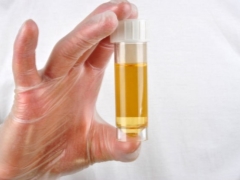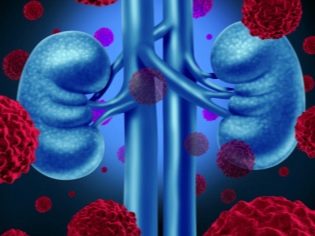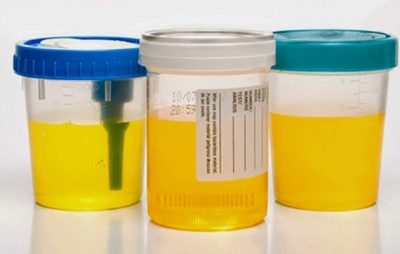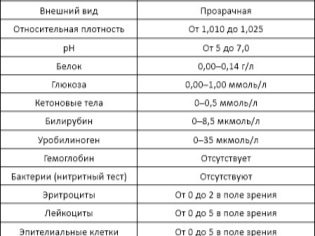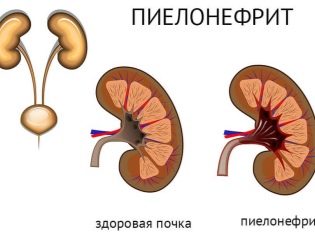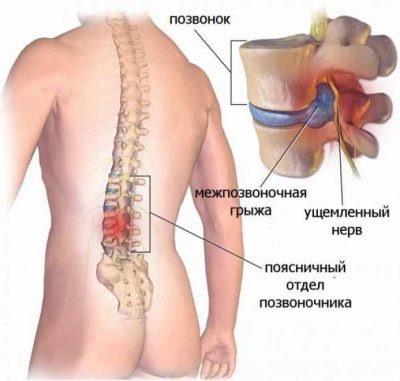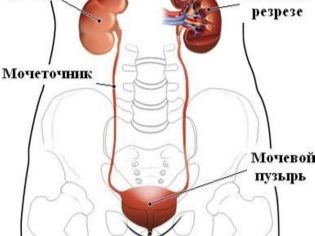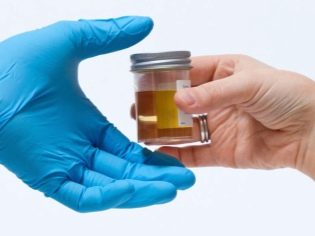Protein in the urine during pregnancy: norms and causes of deviations
The main parameters of urinalysis are very important criteria by which doctors can determine various pathologies of pregnancy at the earliest stages. The appearance of protein in the urinary sediment during gestation of the unborn child is a rather unfavorable symptom that requires careful monitoring. This article describes what normal values exist for this indicator, as well as what is considered a pathology.
Norms
Urine formation occurs in the kidneys. Fluid filtration occurs in special anatomical structures - renal tubules. These microscopic formations help the body get rid of all toxic metabolic products that it no longer needs.
Of particular importance is the work of the kidneys during pregnancy. In this case toxic formations through the kidneys are secreted not only from the mother’s body, but also from the fetus. The waste products are also filtered through the renal tubules, since the baby’s urinary system is formed somewhat later.
Normal in any urine there must be no protein. The appearance of this substance in the urinary sediment should be the reason for the obligatory treatment of a doctor.
Quite often, this condition is passing, in which case it is required Mandatory re-laboratory test. Gynecologists note that during pregnancy, women often have situations in which urine traces of protein appear. Such a value of the analysis does not at all indicate that it is a pathology. Doctors even came up with a special term for this state - transient or benign protein prolapse.
In early pregnancy, the result of a woman’s urine test should not significantly differ from normal normal values. In this case, there should be no protein in the urinary sediment. In some cases, especially if the urine collection was carried out in the very early morning hours immediately after getting out of bed, traces of protein may appear in the analysis.
Doctors believe that first trimester is very important for fetal development.
It is during this period that an unborn child will be laying all the main organs and systems. The load on the kidneys in a pregnant woman at this time is minimal. A significant increase in protein in the urine is already a consequence, as a rule, of the kidney or urinary tract diseases present in the mother.
The appearance of protein in the value of 0.066-0.33 usually occurs in the third trimester. The development of this situation indicates a decent load on the kidneys. At 37-39 weeks of pregnancy, the renal tubules filter the urine already in an intensive mode. Reviews of young mothers also indicate that many of them had such a phenomenon in the late terms of carrying babies.
High rates of protein, rising above 3 g / liter, doctors call proteinuria. This is a pathological condition. Proteinuria can be permanent, but most often it is transient.In this case, after childbirth, the woman may show any diseases of the kidneys or urinary tract. They are the result of persistent proteinuria, which occurred during the period of gestation of the baby.
For the convenience of evaluating the results of urine analysis, doctors use special tables that contain the main values of the normal values of this laboratory test. In order to conduct a correct interpretation of the results, quite a lot of different clinical indicators are evaluated. So, if the future mom bears twins or twins, in this case, she often has protein in the urine of up to 0.15 g / liter.
In order to clarify the diagnosis, doctors may prescribe an additional analysis - determination of daily protein. This laboratory study more accurately shows whether there are any problems with urine filtration in the female body. Normal daily analysis does not exceed 0.2 g / day. For many women who have initial manifestations of impaired renal filtration, the values obtained are 0.1 g / liter, and if the indicator shows 0.3 g / liter or more, then it signals the need to correct this condition.
A general analysis is a rather capacious study. Despite its simplicity and routine, it allows a very comprehensive assessment of the work of the kidneys. To exclude concomitant diseases of the urinary tract, doctors also conduct a quantitative assessment of some indicators:
- White blood cells - It is an important marker of existing infections or pathologies of the organs of the excretory system. In the normal course of pregnancy, this indicator shows less than 10 units in sight. In most cases, leukocytes are 1-5 in the n / a view. Excess of this indicator should be a reason for seeking advice from a urologist or therapist.
- In the normal overall analysis also there are no bacteria. This is usually marked with a “+” or “-” in the medical form of the study. The presence of bacteria is an extremely unfavorable condition, especially during pregnancy. Bacteriuria can lead to the development of dangerous infectious diseases of the kidneys and urinary tract.
- Red blood cells - Another important indicator of the normal functioning of the kidneys. The combination of high protein and erythrocyturia is usually considered a consequence of glomerulonephritis. This dangerous pathology of the kidneys occurs among the female population quite often. Exacerbation of pyelonephritis during pregnancy is extremely dangerous. In this case, there may be various violations of the placental blood flow of the fetus.
Symptoms of increased protein
Minor proteinuria, as a rule, a pregnant woman does not feel. Appetite, sleep, body temperature remain in this case in the normal range. The appearance in the urine of protein to 0.1 g / liter also does not contribute to the appearance of pain in the lower back or the development of puffiness. The first "bells" of trouble appear later, when already the protein values in the urine increase significantly. Pronounced proteinuria and is accompanied by the development of many adverse symptoms.
The appearance of edema on the body is a characteristic bright symptom that accompanies this condition. The severity of the manifestation of this feature may be different. It usually increases by the 38th week of pregnancy. Moms carrying babies often complain that in the 3rd trimester they have a strong puffiness on their face.
Edema can appear on various parts of the body, but there is also a “favorite” localization of the appearance of such edema.
As a rule, in renal proteinuria, swelling appears on the face.
Quite often they occur under the eyes. This feature is due to the fact that in this area the skin is quite thin and delicate.
Severe proteinuria is also accompanied the appearance of edema in the legs. In this case, the lower legs swell.Swelling in this situation in the upward direction - from the bottom up. Feet become more loose, look swollen. When pressing on the skin from above with a finger, a small dent remains, which disappears in a few seconds.
Some pathologies of the kidneys are accompanied by the appearance of pain in the lumbar region. Usually it is enhanced by changing the position of the body or when walking fast. The distinctive manifestation of diseases of the urinary tract - the preservation of pain in the lower back, even at rest.
The occurrence of such a symptom should be a mandatory reason for applying to the urologist.
The appearance of protein in the urine future moms usually detect themselves. In this case, they notice that the urine becomes more turbid. In such a situation, a whitish suspension appears in it. Usually this symptom is well manifested in late pregnancy.
High body temperature - a very unfavorable symptom, especially in the period of gestation of the future baby.
If this clinical symptom is combined with soreness in the lower back and turbid urine, then most likely it indicates the presence of worsening kidney or urinary tract infections in the pregnant woman’s body.
With a rather severe course of exacerbation of chronic pyelonephritis, the body temperature during pregnancy increases to 38 degrees. This condition is extremely unfavorable and requires urgent treatment. In some cases, especially in the late stages of pregnancy, the expectant mother can be hospitalized in the hospital to prevent the development of many dangerous conditions for the fetus.
Causes of protein in the urine
The development of this state can lead a variety of causal factors.
Functional proteinuria may develop as a result of the existing curvature in the lumbar spine.
This clinical option is also called lordotic. It occurs due to the presence of pronounced curvature in the lower back. In some cases, even collecting urine in an upright position may contribute to protein loss. In order to exclude this, doctors recommend collecting material for the study sitting. You can also collect urine and lying.
This type of orthostatic (vertical) proteinuria is usually recorded in the morning portions. If the analysis is collected in the evening, the protein may not appear. Typically, this clinical type of proteinuria develops in tall, thin women, as well as in expectant mothers who have not yet turned 20 years old.
Doctors say that after intense physical exertion, the amount of protein in the urine increases significantly. In the later stages, the emergence of this substance in the urinary sediment can even lead up the stairs to several stairways. In this case, to obtain a reliable result, it is imperative that prior to collecting urine, any physical exertion be excluded a couple of days before going to the laboratory.
Quite often leads to the development of proteinuria severe dehydration. This condition may develop due to severe vomiting. Quite often, this pathology is manifested in pregnant women with toxicosis. This condition can occur immediately in several trimesters of pregnancy. The appearance of protein in the urine may be the result of viral or bacterial infections. Usually, before the onset of this symptom in a sick pregnant woman, the body temperature rises strongly. Also, this condition may occur after a strong hypothermia.
Doctors also note a rather specific type of proteinuria, which is called stagnant. It develops due to the fact that pronounced stagnation of blood begins to occur in the hemodynamics of the pelvis during pregnancy. This is due to the strong pressure of the uterus on nearby organs.
Errors in the diet quite often contribute to the fact that strong disturbances of metabolic processes begin to develop in the female body. Usually the development of this state leads excessive consumption of various protein products, especially of animal origin. If, while taking excessive amounts of proteins, a pregnant woman also eats a lot of salted and tinned foods, this leads to a significant progression of this condition.
In some cases, proteinuria can develop and with a number of diseases of the urinary system. Such pathologies include kidney amyloidosis, chronic glomerulonephritis and pyelonephritis, as well as various neoplasms and cysts, which are formed in the renal tissue. Also, many autoimmune diseases lead to damage to the organs of the excretory system. Systemic lupus erythematosus and vascular vasculitis lead to impaired renal blood flow, which ultimately leads to the fact that a large amount of protein appears in the urinary sediment.
Doctors say that the development of this pathological condition can be preceded by a strong immunological imbalance that occurs between the mother and her future baby. Strong immune inflammation contributes to the fact that on the body of the future mom appear edema.
Types of emerging violations
Doctors distinguish several clinical types of proteinuria, which can occur during pregnancy. This classification helps doctors determine in which particular case treatment prescriptions will be needed.
About functional proteinuria
Minor loss of protein in the urine is called functional proteinuria. This condition is recorded in pregnant women, if the protein values in their urine do not exceed 0.14 g / liter. This state only indicates the initial disturbances in metabolic processes occurring in the body. This phenomenon is in most cases transient. During pregnancy, it may develop several times. An increase in urine protein is already an extremely unfavorable symptom.testifying to the progression of metabolic disorders.
A variety of reasons can lead to the development of this condition in a pregnant woman. These include hernias and pinched intervertebral nerves, increasing pressure in the ureters (especially in 2 and 3 trimesters), hypermobility of the kidneys and nephroptosis, severe psycho-emotional stress or inadequate intensity of physical activity. In these cases, you can get rid of the adverse manifestations without the help of any drugs.
Correction of the developed disorders requires only strict adherence to a certain diet and normalization of the daily regimen.
The gynecologist, together with the therapist, compiles a set of general recommendations that a pregnant woman should strictly follow while carrying a baby.
About pathological proteinuria
Doctors speak about the development of this condition if the protein in the urine reaches values of 0.25-0.3 g / liter. To the development of such a pathological condition lead, as a rule, exacerbations of chronic kidney and urinary tract diseases.
It often happens that the future mom before pregnancy did not even know that she suffers from these pathologies. Many of the diseases of the urinary system for quite a long time are "dumb" and occur only during times of increased stress for the body. This period is just the pregnancy.
It should be noted that not only kidney or urinary tract diseases can lead to the development of this pathological condition in a pregnant woman. Existing diseases of the cardiovascular system and diabetes mellitus also provoke loss of large amounts of protein in the urine during pregnancy.
In the later stages of the development of this condition leads to a strong pressure of the uterus on the blood vessels. In this case, the blood flow in the renal arteries is also impaired. This contributes to the fact that the filtration of urine is slightly disturbed.
About false positive proteinuria
Doctors exclude this condition when protein appears in the general analysis of the urine of a pregnant woman, but various diseases of the kidneys and urinary tract are absent. In this case, its values usually do not exceed 0.055 g / liter. It is not kidney and urinary tract diseases that lead to this condition, but violations in the implementation of personal hygiene rules. Irregular morning and evening washing can help ensure that pregnant women have a small amount of protein in their urine.
To exclude pathological proteinuria Mandatory evaluation and other indicators of the total urine analysis are required. An increase in the number of leukocytes or erythrocytes against a background of altered density suggests that any chronic kidney or urinary tract diseases are present in the body of a pregnant woman. In this case, it is also required to perform urine sowing to eliminate the presence of infectious diseases. Women who have these violations should be required to be registered by a nephrologist or urologist.
Why can such a condition be dangerous?
Proteinuria is far from the safest state during pregnancy. Especially unfavorable is its long and protracted course. In this case, this condition may lead to the development of adverse effects.
Doctors consider one of these conditions the development of chronic diseases of the kidneys and urinary tract. As a rule, the first adverse symptoms of these pathologies begin in future moms still during pregnancy, then over time these diseases progress and may disturb a woman throughout her life.
Gestosis is another dangerous pathology, the development of which doctors try to prevent in patients with signs of persistent proteinuria. Hypertensive disease or diabetes mellitus in a woman before pregnancy can lead to the development of this pathology. In some cases, preeclampsia develops and without prior diseases. This pathology is usually accompanied by massive proteinuria. In this case, a pregnant woman can lose 5 grams or more of protein daily. Such a process will inevitably lead to pronounced metabolic disturbances. Ultimately, this will contribute to the development of signs of insufficiency of the placental blood flow in a future baby or the possible appearance of intrauterine developmental defects.
Doctors say that cases of this disease among pregnant women increase every year. In every 5 registered cases, the pathology is accompanied by severe kidney damage, which is called nephropathy. Severe course of this pathology can even lead to the death of the mother or fetus.
How to reduce elevated protein?
Severe proteinuria is a condition that must be treated. The obstetrician-gynecologist together with the therapist carries out such treatment. In some cases, a nephrologist is also invited to make recommendations. This mainly occurs in a situation if a pregnant woman has any diseases of the kidneys and urinary tract.
Remove adverse symptoms can not only with the help of drugs. Doctors recommend to future moms at this time first normalize the daily routine. Pregnant women with signs of persistent proteinuria are recommended to be recommended. sleep at least 8-9 hours a day. To improve sleep you should air the room before bedtime.
In the acute period of the disease, doctors recommend comply with bed rest. If the disease is severe enough, then in such a situation a pregnant woman can be hospitalized. Mode correction is carried out gradually. All future moms should not overwork. Active sports and intense exercise should be postponed for a time after delivery.
In order to reduce puffiness and reduce the amount of protein in the urine, is used special diet. She excludes any canned and pickled products.
Also limited to salt. Excessive salting of ready-made dishes will only contribute to the appearance of edema on the body.
Drug therapy includes the appointment of sedatives and diuretics. Euphylline and sulphate magnesia is used to improve renal blood flow. These substances are administered intravenously. Such treatment is carried out only in the hospital.
To reduce puffiness Doctors prescribe diuretics. They help reduce the amount of circulating fluid in the body. Typically, small doses of diuretic drugs are used to achieve a positive effect. In severe cases, diuretics can be administered parenterally.
Quite often, proteinuria is accompanied by the development of hypertension. In this case, antihypertensive drugs are used to normalize hypertension. Their selection is carried out individually, taking into account the initial values of blood pressure. These drugs are prescribed by a therapist. If a pregnant woman has arterial hypertension accompanied by the development of proteinuria, then in this case she must be in the dispensary register.
In severe cases, some vascular agents. Their use also prevents the development of cerebral edema. These funds include "Reopoliglyukin" and "Mannitol". These drugs are administered by intravenous route. A 20% albumin or plasma solution may also be required to improve overall well-being.
To improve the filtration function of the kidneys necessarily drinking mode is limited. To do this, the future mom should drink no more than 1 liter of fluid per day. As a beverage, you can also use a variety of berry and fruit drinks. It is important to remember that before use they should not be sweetened strongly. Also, doctors recommend drinking boiled dogrose at home.
If pathological changes have arisen due to rheumatological diseases, then in this case a mandatory appeal to a rheumatologist for consultation is required. The doctor will prescribe the appropriate treatment. In some clinical situations, prolonged therapy is required. The appearance of protein in the urine requires the mandatory treatment of the future mom to the doctor.
For the prevention of dangerous complications, monitoring and monitoring the development of this condition is imperative. In this case, the future mom will need to visit the clinic a little more often.
